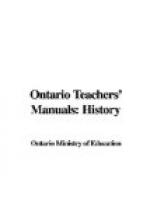(The Spanish were on an expedition of conquest; the sailors were ill-trained and many serving against their will. The English were defending their homes; they forgot their religious and political differences in their patriotism; the sailors were hardy, fearless, and most skilful in handling their ships.)
3. The affair at Cadiz.
(Retarded the invasion
for a year, gave England more time for
preparation, and encouraged
hopes of success.)
4. The battle in the Channel.
(Armada attacked on
the way to Dover, July 28-Aug. 6, 1588;
fireships at Calais,
Aug. 6; final engagement, Aug. 8-9; a chance
for a vivid description
by the teacher.)
5. Storm completes the ruin of the Armada.
(Facts to be given as to the losses of the Armada; recall stories of wrecked Spanish vessels on the coasts of Scotland, etc., and recommend class to read some story, such as Kingsley’s Westward Ho!)
III. RESULTS
1. Ruin of Spain and of Philip’s ambitions. [Connect with I. 1 (a)]
2. Influence on England’s patriotism and maritime power.
3. Greater religious tolerance in England.
4. Marvellous growth of literature in England partly due to this.
5. Effect on America. It decided for all time that Spain should not rule the New World, but that the Anglo-Saxons should, with all their ideals of political, social, and religious liberty.
(See P.S. History of England, secs. 135-142.)
LESSON ON THE FEUDAL SYSTEM
(As many lesson periods as may be found desirable)
Aim. To give the pupils a knowledge of the manner in which land was held, (1) by the Saxons at different periods on the continent and in England; (2) by the French; (3) by the Normans under William the Conqueror, showing the changes he made in both Saxon and French systems.
STEP I
1. Introduction. By questioning, the teacher elicits from one pupil that his father owns a farm; from another, that his father rents a farm; from a third, that his father works one “on shares.” From this may be derived the meaning of “freehold,” “leasehold,” and “on shares,” as applied to ways of holding land. For town and city classes, a parallel may be made by substituting “house” for “farm.” As holding property “on shares” is not so common in cities, suggest possible cases, such as a florist’s business, a rink, etc.
2. Let pupils read the sketch of the Saxon or “mark” system given in the Ontario Public School History of England, pp. 22 and 30; and then draw a plan of a Saxon village from the passages read.




